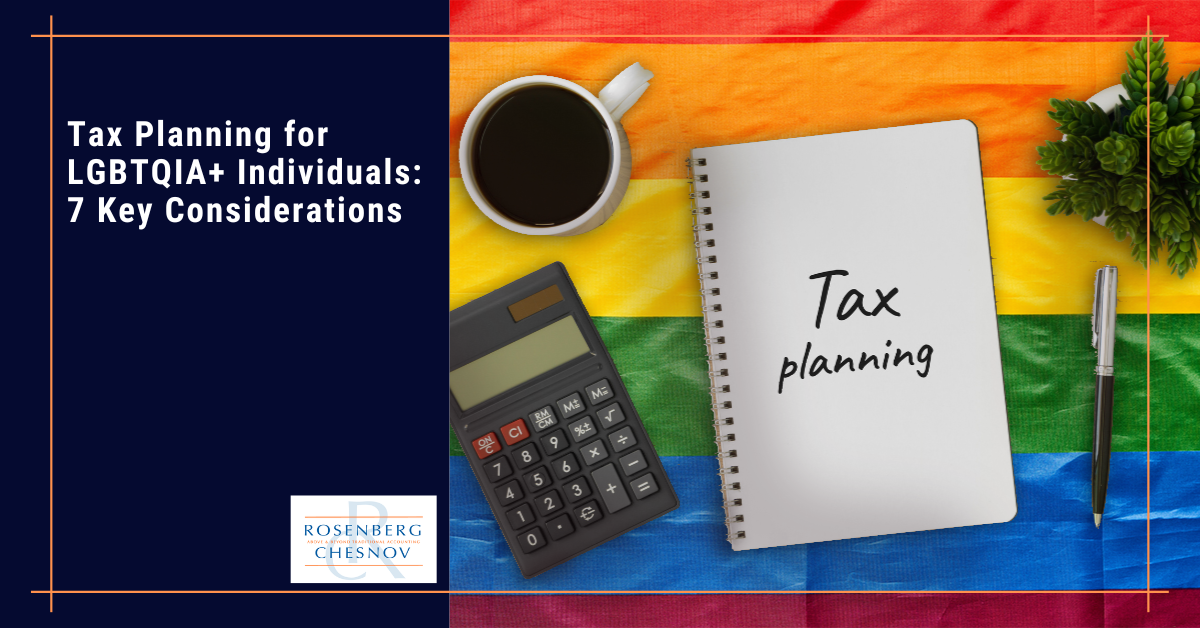

Tax Advantages of Home Ownership
Category: Tax
Tax planning can be daunting for anyone, but for LGBTQIA+ individuals, there can be unique challenges and considerations to navigate.
From estate planning to retirement savings to healthcare, trying to make sense of it all can be complex and lead to missed opportunities for tax benefits, instances of discrimination, and higher costs or additional financial burdens.
Moreover, adding to the confusion, LGBTQIA+ individuals face a constantly evolving legislative landscape as new proposals are introduced that build on or modify existing legislative milestones. Up-to-date knowledge of this landscape may be essential to ensure equal access to financial resources and opportunities.
That’s why it’s crucial for LGBTQIA+ individuals to have a solid understanding of tax planning considerations that specifically impact them.
Continue reading to discover:


As we continue into the year, several updates and proposals could significantly impact year-end tax planning for LGBTQIA+ individuals.
The Respect for Marriage Act, for example, is a significant legislative proposal expected to pass the House and provide federal protection for same-sex marriages. It will also remove many of the uncertainties that same-sex couples face in their annual tax planning.
Additionally, the House is considering two PRIDE Acts to promote gender equality in the tax code and expand access to benefits for the LGBTQIA+ community.
The PRIDE Act of 2021 would allow same-sex couples to amend their tax returns for all previous years in which they were married, resulting in potential refunds of over $60 million. Meanwhile, the PRIDE Act of 2022 would expand the Office of Minority and Women Inclusion to encompass LGBTQIA+ identities and promote an LGBTQIA+ reference in the Dodd-Frank Wall Street Reform and Consumer Protection Act.
Finally, President Biden’s Executive Order Advancing Equality for LGBTQIA+ Individuals aims to provide greater access to federal programs and benefits for marginalized individuals while promoting expanded data collection and appointing LGBTQIA+ leaders to high-level government positions.
As these proposals and actions continue to unfold, it is critical for members of the LGBTQIA+ community to stay informed about the tax implications of these changes and how they can adjust their tax planning accordingly.
Likewise, forthcoming legislative changes aside, it’s also essential to understand the tax implications of various other decisions LGBTQIA+ individuals may face.
The 2015 Obergefell v. Hodges ruling legalized same-sex marriage nationwide and granted same-sex couples access to federal tax benefits, including joint tax returns. However, thirteen U.S. states still have bans on same-sex marriage despite the Supreme Court decision.
This can lead to confusion and uncertainty in tax planning and filing for same-sex couples. Meanwhile, couples in domestic partnerships or civil unions may face even more complexity — state laws vary on recognizing these relationships for tax purposes.
In California, for example, domestic partners file joint state tax returns as if they were married, but they cannot file joint federal tax returns.
Estate planning is crucial for LGBTQIA+ individuals who may face additional legal challenges.
Same-sex couples in marriage or civil union may be eligible for the same estate tax exemptions as opposite-sex couples. However, domestic partners or single individuals may face higher tax rates, making it essential for everyone, particularly LGBTQIA+ individuals, to create a will or trust.
Without a will, assets get distributed according to state law, which may not align with your wishes. This is of particular concern for LGBTQIA+ individuals who may face legal challenges from unsupportive family members. Therefore, creating a will or trust is essential to ensure your assets get distributed according to your preferences.
LGBTQIA+ individuals considering adoption or surrogacy must understand the tax implications of these decisions.
Adoption expenses, including legal fees, are tax-deductible up to a certain amount. However, surrogacy expenses are not tax-deductible, which may lead to a significant tax burden.
It’s worth noting that the tax implications of adoption and surrogacy can vary depending on the state or country where the child is adopted or born. For instance, if you adopt a child from a state that does not recognize same-sex marriage, you may not receive the same tax benefits as opposite-sex couples.
LGBTQIA+ individuals can reduce their tax burden while supporting causes they care about through charitable giving. Donating to qualifying organizations can be tax-deductible, but it’s essential to keep detailed records (learn more about smart tax record-keeping here) and understand which organizations qualify for deductions.
Furthermore, corporations may offer matching gift programs that can amplify the impact of your charitable giving. If your employer has a matching gift program, make sure to participate in it.
For LGBTQIA+ individuals, retirement planning is essential as they may not have access to traditional retirement benefits through their employer due to factors such as employment discrimination, lack of recognition of same-sex relationships, lack of employment protections, etc.
Contributing to an Individual Retirement Account (IRA) is a viable option as it offers tax benefits for retirement savings. If you are self-employed, you may also be eligible for a Simplified Employee Pension (SEP) IRA or a Solo 401(k).
Healthcare access is a critical issue for many LGBTQIA+ individuals and has tax implications.
Under the Affordable Care Act (ACA), same-sex spouses are eligible for the same health insurance benefits as opposite-sex spouses. However, you may not qualify for these benefits in a domestic partnership or civil union.
It’s important to carefully review your health insurance options and consider the tax implications of each. In some cases, enrolling in a plan through a spouse or partner’s employer may be more beneficial, while in other cases, enrolling in a plan through the ACA marketplace may be the best option.
LGBTQIA+ individuals may have access to tax credits and deductions to help reduce their tax burden, including the Earned Income Tax Credit (EITC), the Child and Dependent Care Tax Credit, and the Adoption Tax Credit.
Furthermore, for LGBTQIA+ individuals who experience discrimination in their workplace or personal life, the Civil Rights Tax Relief Act of 2003 provides tax benefits that can offset some of the associated costs. This law allows individuals to deduct expenses related to fighting discrimination, such as legal fees and costs associated with relocating to a new job or residence.
In all seven considerations discussed above, the specific implications may vary state by state. Additionally, any tax planning strategy has numerous intricacies and potential pitfalls, and the legislative landscape remains in flux.
It’s useful for anyone to consult a tax professional to take advantage of all available benefits. However, given the unique challenges and considerations faced by LGBTQIA+ individuals, working with a professional to navigate these complexities is even more valuable.
By understanding key considerations and the latest news impacting the tax planning landscape, members of LGBTQIA+ communities can ensure more equal access to resources and opportunities, build a secure financial future, and better achieve long-term goals.
If you are a client and would like to book a consultation, call us at +1 (212) 382-3939 or contact us here to set up a time.
If you aren’t a client, why not? We can take care of your accounting, bookkeeping, tax, and CFO needs so that you don’t have to worry about any of them. Interested? Contact us here to set up a no-obligation consultation.
Interested in receiving updates in your mailbox? Check out our newsletter, full of information you can use. It comes out once every two weeks, and you can register for it below.


Category: Tax


Category: Individual


Category: Accounting
Send us a message and we will contact you as soon as possible.
Send us a message and we will contact you as soon as possible.
Jeff Coyle, CPA, Partner of Rosenberg Chesnov, has been with the firm since 2015. He joined the firm after 20 years of business and accounting experience where he learned the value of accurate reporting, using financial information as a basis for good business decisions and the importance of accounting for management.
He is a diligent financial professional, able to manage the details and turn them into relevant business leading information. He has a strong financial background in construction, technology, consulting services and risk management. He also knows what it takes to create organizations having built teams, grown companies and designed processes for financial analysis and reporting.
His business experience includes:
Creating and preparing financial reporting, budgeting and forecasting.
Planning and preparation of GAAP and other basis financial statements.
Providing insight on financial results and providing advice based on those results.
Jeff also has a long history of helping individuals manage their taxes and plan their finances including:
Income tax planning and strategy.
Filing quarterly and annual taxes.
Audit support.
General financial and planning advice.
Prior to joining the firm in 2015, Jeff was in the private sector where he held senior financial and management positions including Controller and Chief Financial Officer. He has experience across industries, including construction, technology and professional services which gives him a deep understanding of business.
Jeff graduated from Montclair State University, he is a CPA and member of the American Institute of Certified Public Accountants, New York State Society of Certified Public Accountants and New Jersey State Society of Public Accountants.
Jody H. Chesnov, CPA, Managing Partner of Rosenberg Chesnov, has been with the firm since 2004. After a career of public accounting and general management, Jody knows the value of good financials. Clarity, decision making, and strategy all start with the facts – Jody has been revealing the facts and turning them into good business results for more than three decades.
He takes a pragmatic approach to accounting, finance and business. His work has supported many companies on their path to growth, including helping them find investors, manage scaling and overcome hurdles. His experience and passion for business reach beyond accounting and he helps businesses focus on what the numbers mean organizationally, operationally and financially.
He has a particular expertise in early-stage growth companies. His strengths lie in cutting through the noise to come up with useful, out of the box, solutions that support clients in building their businesses and realizing their larger visions.
Prior to joining the firm in 2004, Jody was in the private sector where he held senior financial and management positions including General Manager, Chief Financial Officer and Controller. He has experience across industries, which gives him a deep understanding of business.
Jody graduated with a BBA in Accounting from Baruch College, he is a CPA and member of the American Institute of Certified Public Accountants and New York State Society of Certified Public Accountants.
In addition to delivering above and beyond accounting results, Jody is a member of the NYSCPA’s Emerging Tech Entrepreneurial Committee (ETEC), Private Equity and Venture Capital Committee and Family Office Committee.
He is an angel investor through the Westchester Angels, and has served as an advisor for many startup companies and as a mentor through the Founders Institute.